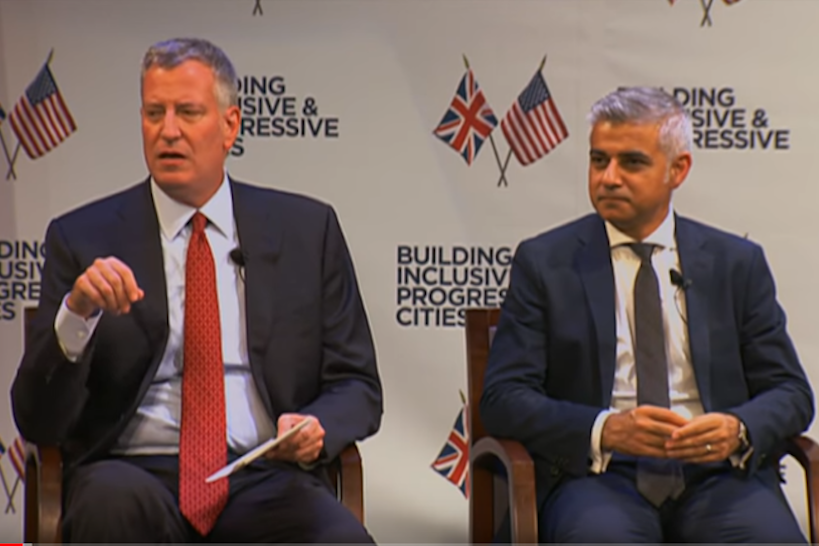New York Mayor Bill de Blasio threw his support behind cannabis legalisation at the end of 2018, saying that it should be accompanied by the expungement of 700,000 New Yorkers arrested for low-level marijuana possession, along with equity programmes to encourage diversity in a new industry which he says he wants to see kept out of the hands of ‘Big Pot’.
Although Sadiq Khan does not hold the same kind of power in Britain as London Mayor, there is no reason why he shouldn’t be called upon to take the same stand on the same progressive, anti-racist principles.
de Blasio’s Task Force published a 77-page report endorsing legalisation. It calls for a strong, public health-focused regulatory framework and the empowerment of local government to prevent corporate greed, foster small businesses and meet the demands of New York City communities.
“I support legalisation because we’ve developed a path forward that will help make our City fairer,” he said.
The stance puts him in agreement with New York Governor Andrew Cuomo, who aimed to pass a legalisation bill this year but recently admitted that complications are likely to push it back to 2020. “Let’s legalise the adult use of recreational marijuana once and for all,” said Cuomo, citing what he called needless and unjust criminal convictions and the debilitating stigma around marijuana.
This same week, Brooklyn District Attorney Eric Gonzalez set the tone by tearing up nearly 1,500 open warrants and erased dozens of past convictions for pot possession.
“I do not believe these cases keep us safer; they cause a lot of distrust in our justice system,” said Gonzalez. “These convictions really have a dramatic impact on the quality of someone’s life.”
“The time has come to rewrite the rules,” said de Blasio. “To break the mold of the past. To repair and redeem the lives of people who were treated unjustly.
“We have one chance to get this right. This is unlike so many other things we have dealt with. We have a chance to get it right here from the beginning, because we’re at the starting line. And if we just legalise marijuana and don’t deal with the underlying issues, we will look back and say what a lost opportunity this was,” de Blasio said. “We have a chance to create a brand new industry that will lift up everyday New Yorkers. And we have a chance to choke off corporate America in the process and not let them get their greedy hands on this industry in this state.
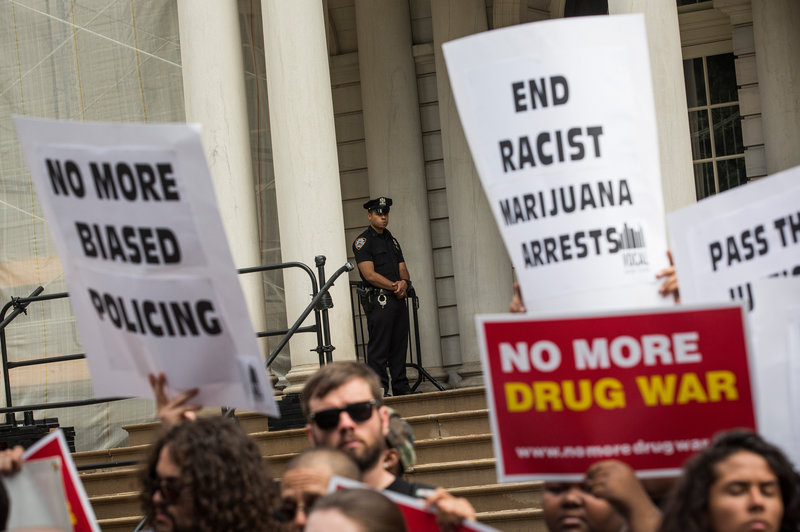
“Legalisation is at a crossroads, really. There’s two routes. Either corporate cannabis will take control, or the will of the people will win the day. That is the choice that we have before us, and we know what happens when the corporate sector runs the show,” de Blasio said. “We can’t let ‘Big Pot’ in the door to begin with. We can’t let the corporate sector dominate this debate, and lord knows they would love to. Those who bore the past burdens should reap the benefits of the future. Not corporate executives.”
In Manhattan, a person of colour is 15 times more likely to have been arrested for cannabis possession than a white person. De Blasio called for the expungement of the records of those with past, low-level cannabis convictions.
“Let’s give New Yorkers a clean slate and a fair future,” he said. “The majority of licenses to sell and produce legal weed must go to those whose lives were damaged by illegal weed.”
The report’s key goals are:
- Establish an Equitable Licensing System: Create local licensing programs, regulate public places of consumption, regulate home and commercial cultivation and manufacturing, and regulate home delivery services.
- Preserve Communities: Establish zoning and area restrictions for cannabis businesses, as well as restrictions on the density to determine how the location of cannabis businesses can best fit into the fabric of its communities.
- Protect Public Health: Enforce age limits of 21 and over with civil rather than criminal penalties to violations of cannabis regulations to the greatest extent possible consistent with public safety.
- Right Historic Wrongs: Recommend automatic expungement of criminal records relating to conduct that may be legalised, including personal use and possession of certain quantities – subject to notice and opportunity by District Attorneys’ Offices to raise objections in specific cases.
- Ensure Product Safety: Recommend statewide standards for product safety, labelling and packaging, marketing, and advertising, as well as a mandatory seed-to-sale tracking system accessible to State and local regulators and financial institutions serving cannabis-related businesses.
- Put Small Businesses First: Work with State authorities to reduce the risk of market domination by big businesses and foster sustainable growth, in part, by restricting businesses from owning and controlling each stage of the supply chain, which may otherwise be owned by different, specialised businesses.
- Create Equal Opportunity: Participate in a dual state-local licensing structure that will permit the City to pursue its own innovations to promote economic opportunities created by this new market, subject to the minimum standards set by the State.
- Ease Access to Capital: Advocate for legislation expressly providing that banking and professional services for cannabis-related businesses do not violate State law.
- Make Fair Investments: Allocate tax revenue, licensing fees, and other sources of financing to administer the new industry and support cannabis businesses and workers, with a focus on target populations and community reinvestment.
- Build Local Businesses: Develop an incubator programme to provide direct support to equity applicants in the form of counselling services, education, small businesses coaching, and compliance assistance.
Here in Britain, Sadiq Khan must be pressed to take notice of de Blasio’s stand and to take a similar position. As in New York, London has a history right up to the present day of disproportionately targeting people of colour with racist policing.
Despite an avowed commitment from central government to tackle discrimination, to pay greater attention to ethnic disparities in criminal justice and the use of stop and search, progress since 2013 has been minimal.
A report by StopWatch, Release and LSE – The Colour of Injustice: ‘Race’, drugs and law enforcement in England and Wales – shows that in 2016/17, disproportionality increased as the use of stop and search has declined, indicating that the remaining use of the powers is more heavily concentrated on black and minority ethnic groups.
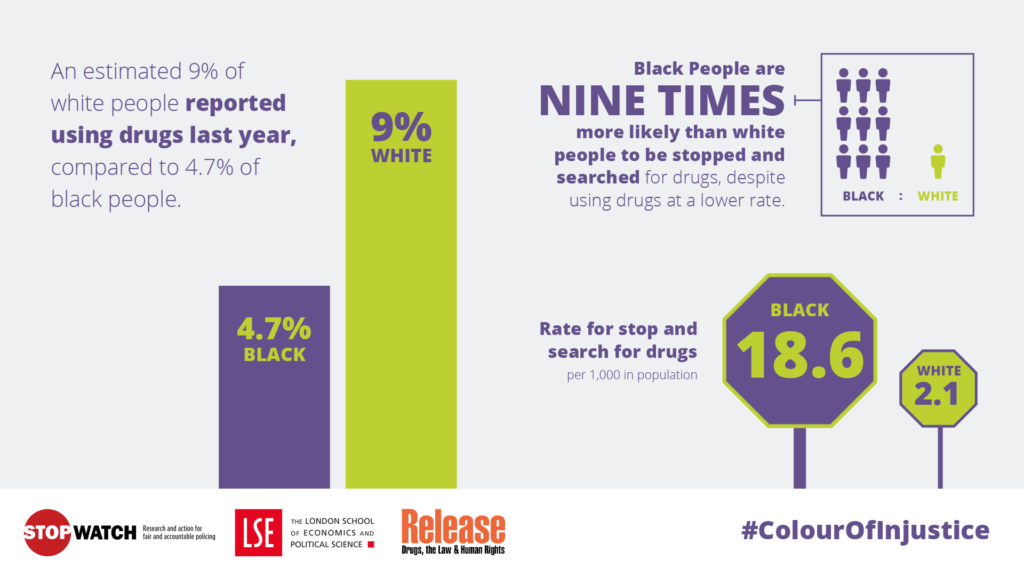
It states that: “Black people were stopped and searched at more than eight times the rate of whites in 2016/17. Asian people and those in the ‘mixed’ group were stopped and searched at more than twice the rate of whites.
“Stop-searches for drugs are more disproportionate than stop-searches for other offences. Black people were stopped and searched for drugs at almost nine times the rate of whites, while Asian people and those in the ‘mixed’ group were stop-searched for drugs at almost three times the rate of whites.”
This is despite the fact that “the ‘find’ rate for drugs is lower for black than white people, suggesting drug searches on black people may be based on weaker grounds for suspicion than those on white people”.
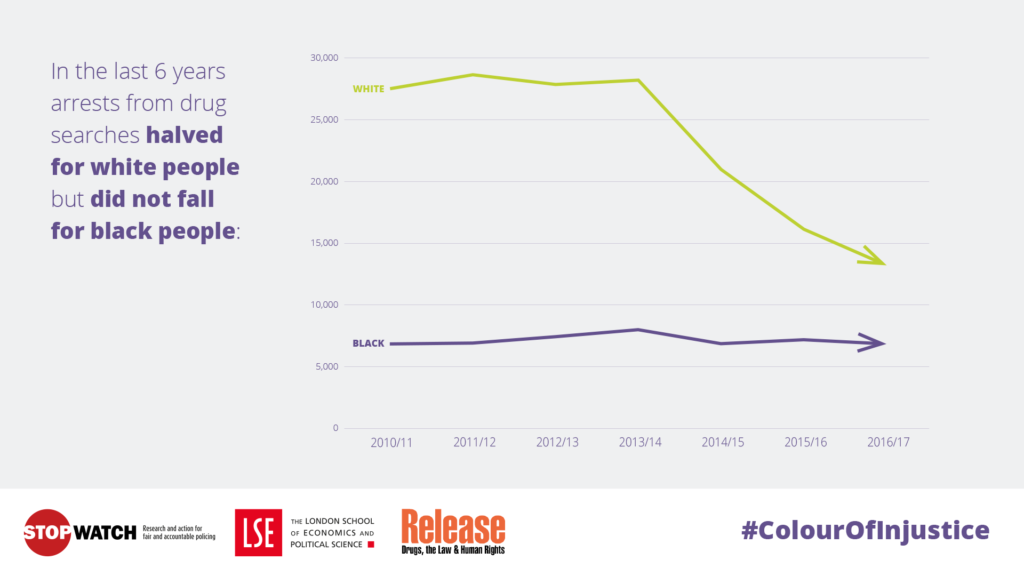
“Since 2010/11 more than 80% of drug offences recorded by police have been possession offences and more than 60 per cent have been for cannabis possession. Extrapolating from these figures indicates that more than a third of all stop-searches are for suspected cannabis possession offences (the exact proportion varies from 34% to 39% depending on the year). It follows that police forces are making operational decisions to target low-level drug possession offences over other crimes.
“Almost one-fifth of all arrests of black people result from stop and search, which is more than three times the proportion for white people: 17% compared with 5%. For drugs, 57% of arrests of black people result from stop and search compared with 31% for whites. These disparities suggest that the disproportionate application of stop and search is largely a function of police policy and decision-making rather than crime.
“The number of arrests from stop and search has fallen much more sharply for white than black people. Arrests from drug searches halved for white people between 2010/11 and 2016/17, but have been maintained for black people.
“Black and Asian people were convicted of cannabis possession at 11.8 and 2.4 times the rate whites despite their lower rates of self-reported use, providing prima facie evidence of discrimination. Black people made up a quarter of all those convicted of cannabis possession even though they comprise less than 4% of the population.
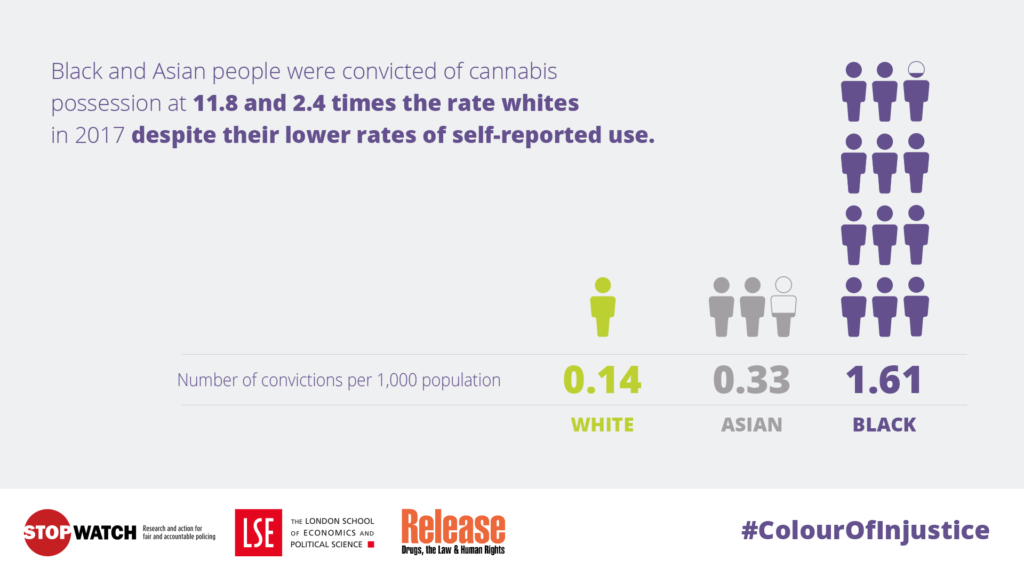
“More black people were prosecuted and convicted of cannabis possession than for the supply of Class A and B drugs combined in 2017. For white people the balance was reversed.”
Avinash Tharoor, Policy and Communications officer at Release, told UKCSC: “The majority of drug offences recorded by UK police are for cannabis possession. This is an incredible waste of resources and police time, and it leads to the needless criminalisation of thousands of people for what is essentially a victimless crime.
“To make matters worse, the implementation of cannabis prohibition in the UK – as in the US – disproportionately targets ethnic minorities. Release’s research shows that black people in England and Wales are convicted of cannabis possession at almost 12 times the rate of white people, despite black people’s lower rates of use.
“It is vital to end this punitive and discriminatory approach. We would welcome Mayor Sadiq Khan using his influential position to lend support to the decriminalisation of all drug possession in London. While Westminster controls the nation’s drug laws, Khan could encourage the Metropolitan Police to implement a ‘diversion from arrest’ programme for people found with small amounts of cannabis or other drugs, as has already been implemented by other police forces around the country.”
So would Sadiq Khan take a stand if the pro-legalisation movement puts him under enough pressure? Sadly his office did not respond to a request from UKCSC to comment.
But we will continue to put pressure on him to show some courage!

